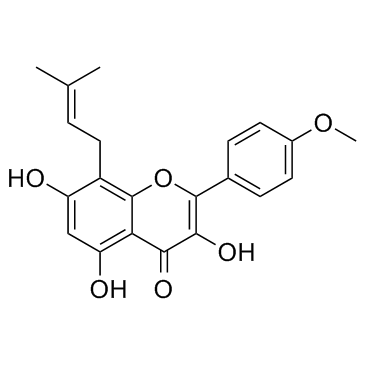Icaritin (Anhydroicaritin) |
| Katalog-Nr.GC32762 |
Icaritin (Anhydroicaritin) (Anhydroicaritin) ist ein Prenylflavonoid-Derivat aus Epimedium brevicornuMaxim. und hemmt stark die Proliferation von K562-Zellen (IC50 von 8 μ M) und primÄren CML-Zellen (IC50 von 13,4 μ M fÜr CML-CP und 18 μ M fÜr CML-BC). Icaritin (Anhydroicaritin) kann MAPK/ERK/JNK- und JAK2/STAT3/AKT-Signale regulieren und verbessert auch die Osteogenese[3.
Products are for research use only. Not for human use. We do not sell to patients.

Cas No.: 118525-40-9
Sample solution is provided at 25 µL, 10mM.
Icaritin(Anhydroicaritin) is a component of Epimedium flavonoid isolated from Herba Epimedii; enhances osteoblastic differentiation of mesenchymal stem cells (MSCs) while it inhibits adipogenic differentiation of MSCs by inhibiting PPAR-g pathway.IC50 value:Target: in vitro: Icaritin was unable to promote proliferation, migration and tube like structure formation by human umbilical vein endothelial cells (HUVECs) in vitro [1]. Icaritin potently inhibited proliferation of K562 cells (IC50 was 8 μM) and primary CML cells (IC50 was 13.4 μM for CML-CP and 18 μM for CML-BC), induced CML cells apoptosis and promoted the erythroid differentiation of K562 cells with time-dependent manner. Furthermore, Icaritin was able to suppress the growth of primary CD34+ leukemia cells (CML) and Imatinib-resistant cells, and to induce apoptosis [2]. icaritin strongly inhibited the growth of breast cancer MDA-MB-453 and MCF7 cells. At concentrations of 2-3 μM, icaritin induced cell cycle arrest at the G(2)/M phase accompanied by a down-regulation of the expression levels of the G(2)/M regulatory proteins such as cyclinB, cdc2 and cdc25C. Icaritin at concentrations of 4-5 μM, however, induced apoptotic cell death characterized by the accumulation of the annexin V- and propidium iodide-positive cells, cleavage of poly ADP-ribose polymerase (PARP) and down-regulation of the Bcl-2 expression [3].in vivo: In mouse leukemia model, Icaritin could prolong lifespan of NOD-SCID nude mice inoculated with K562 cells as effective as Imatinib without suppression of bone marrow. Icaritin could up-regulate phospho-JNK or phospho-C-Jun and down-regulate phospho-ERK, phospho-P-38, Jak-2, phospho-Stat3 and phospho-Akt expression with dose- or time-dependent manner [2].
[1]. Yao D, et al. Icaritin, an exogenous phytomolecule, enhances osteogenesis but not angiogenesis--an in vitro efficacy study. PLoS One. 2012;7(8):e41264. [2]. Zhu Jf, et al. Icaritin shows potent anti-leukemia activity on chronic myeloid leukemia in vitro and in vivo by regulating MAPK/ERK/JNK and JAK2/STAT3 /AKT signalings. PLoS One. 2011;6(8):e23720. [3]. Guo Y, et al. An anticancer agent icaritin induces sustained activation of the extracellular signal-regulated kinase (ERK) pathway and inhibits growth of breast cancer cells. Eur J Pharmacol. 2011 May 11;658(2-3):114-22.
Average Rating: 5 (Based on Reviews and 22 reference(s) in Google Scholar.)
GLPBIO products are for RESEARCH USE ONLY. Please make sure your review or question is research based.
Required fields are marked with *




















